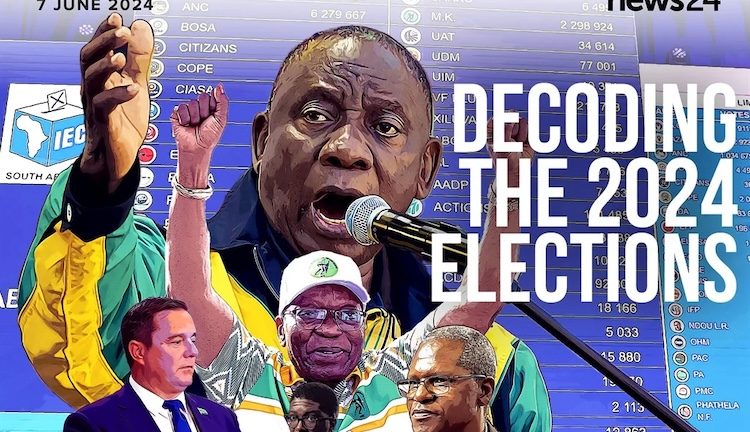By Lisa Vives, Global Information Network
NEW YORK | 9 June 2024 (IDN) —Thirty years after the first democratic elections in 1994, South Africa finds itself at a political inflection point. The 2024 election saw a collapse in the vote for the ruling African National Congress which received only 40% of the vote, 17 percentage points lower than 2019 – less than a majority of votes cast for the first time.
Turnout was also down 6%. The loss was even more notable as it followed a bitter pre-election split in the ANC with former president Jacob Zuma leading a break away party (MK Party).
At stake is whether or not South Africa will make rapid progress on poverty and inequality or whether it sends its population even deeper into a state of deprivation.
South Africa’s voting age population is roughly 42 million, just over 27 million of whom are registered and of those, only 16 million registered voters cast ballots. In other words, according to Liberation news, abstention was the biggest winner of the 2024 election.
Some have framed this loss as a rejection of the ANC government. But others say the results show that the election was a rejection of the entire political establishment and the idea that casting a ballot can bring positive change—a reflection of the dire state of the country.
South Africa’s mineral wealth is generating at least $125 billion a year with at the least $2.4 trillion worth of minerals still left in the ground. Yet 50% of the country lives in poverty, 65% live in rural areas. Unemployment officially stands at 32.9%, 55% of households are without running water and 34% still don’t have flush toilets.
South Africa has the highest level of income inequality on earth. In addition, 75% of farmland is still owned by whites.
The ANC, Zuma’s MK party and the Economic Freedom Fighters (EFF) of Julius Malema have all pledged to address these issues more vigorously if elected. The ANC told voters they would end poverty by 2030. MK and EFF promised voters they would expropriate land without compensation and nationalize mines and banks. All promised to expand access to healthcare, housing and education, at little to no cost.
According to the socialist Liberation news, a clear majority of South African voters are looking for policies that seriously roll back poverty and the legacies of settler colonialism while taking an anti-imperialist approach to international relations.
A government of national unity?
Meanwhile, the ANC is considering its options, including being a government of national unity with coalition partners.
“A government of national unity is the most viable, most effective and most powerful way of meeting the expectations of all South Africans at this particular moment,” declared South African President Cyril Ramaphosa.
“It’s the best option to move our country forward.”.
A coalition of major parties would resemble the cabinet of Nelson Mandela who worked with other parties – even the Afrikaner-led National Party which was responsible for the racist system of apartheid—back in 1994.
But this drive to create some sort of coalition government – particularly between the ANC and Democratic Alliance – would represent a shift to the right and involve further privatization os state-owned companies, implementation of austerity budgets, and take the country in the opposite direction of where 60% of the electorate would like it to go.
The ANC is under pressure to find coalition partners and conclude negotiations by June 16 according to South Africa’s constitution.
But the election outcome has created a complex situation for Ramaphosa and his party and a difficult search for partners.
Most of the opposition parties differ with the ANC on various socioeconomic policies and are also at odds with each other on policies like land redistribution and affirmative action.
Julius Malema, leader of the Economic Freedom Fighters party, has already rejected President Ramaphosa’s proposal of a government of national unity and has accused the ANC of arrogance despite having lost the election.
The Democratic Alliance, for its part, is fiercely opposed to the ANC’s efforts to create a welfare state – especially a government funded national health service which the DA rejects as too expensive and threatens the future of the private health sector.
Any deal with the Democratic Alliance would be welcomed by financial markets but unpopular with many ANC supporters who regard it as the party of South Africa’s wealthy white minority.
“A lot of people that are disaffected in South Africa … want to see a much more radical policy orientation than what the ANC could provide,” said Oscar Van Heerden, researcher and author of books on the ANC..
Will South Africa move towards eliminating poverty and stake out its own ground in a multipolar world order, asks Eugene Puryear of Liberation news. Or regress towards a role more akin to the former apartheid regime as a node for the West in Africa and beyond?
“South Africa’s pivotal election has thrown the country into uncharted waters.The country now faces opportunities and risks requiring leadership,” writes the Africa Center for Strategic Studies. “The challenges of building a government of national unity are formidable.” [IDN-InDepthNews]
Photo credit: news24


